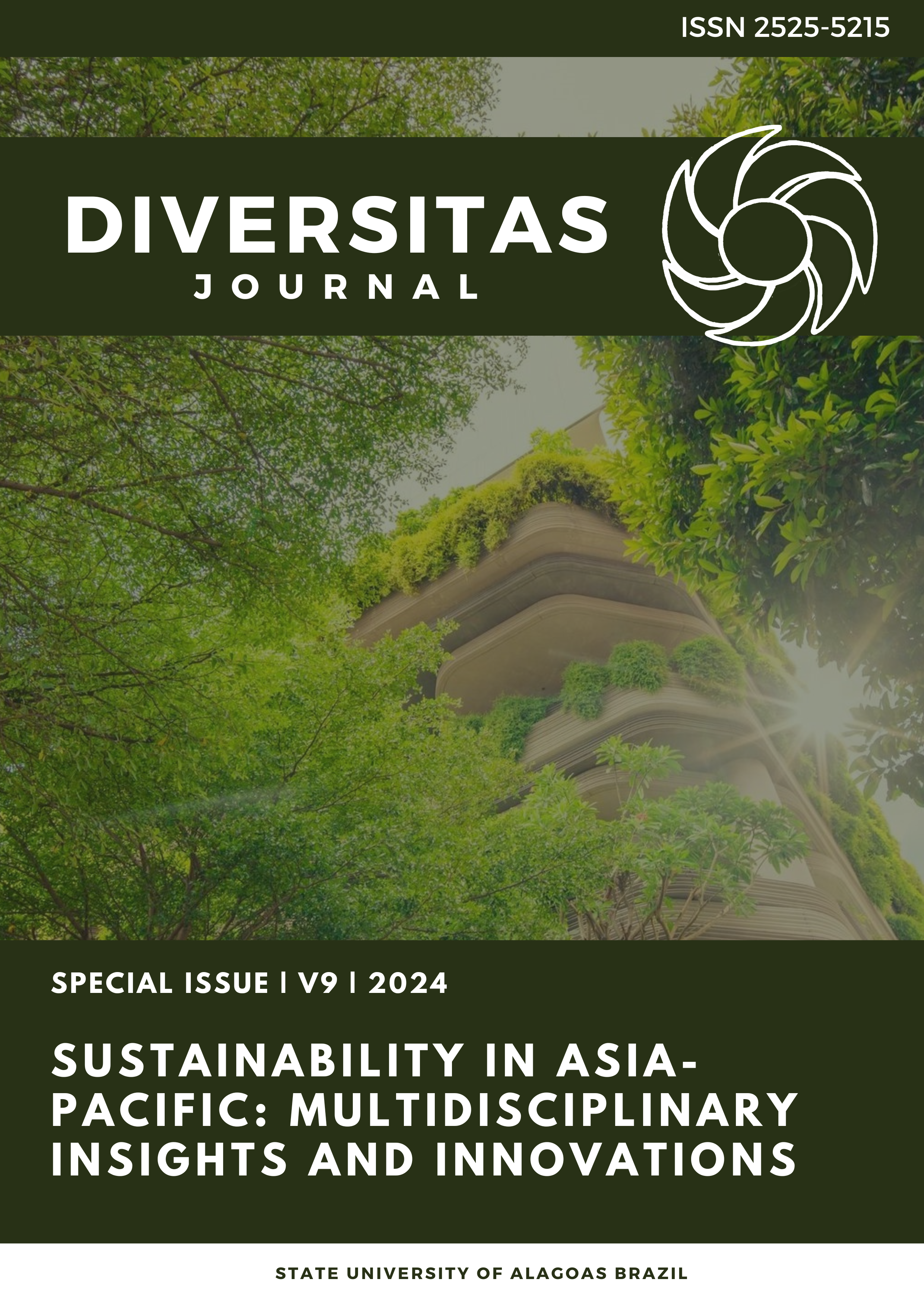Household awareness, acceptance, and willingness to pay for renewable energy
DOI:
https://doi.org/10.48017/dj.v9i1_Special.2944Keywords:
willingess-to-pay, awareness, renewable energyAbstract
The purpose of this study was to determine the level of household awareness, acceptance, and willingness to pay for renewable energy. It is quantitative research that determines the significant difference specifically in the amount of willingness to pay for renewable energy when analyzed according to profile; the significant relationship precisely between the level of awareness and willingness to pay; and the significant relationship particularly between the level of technology acceptance and willingness to pay. The study's independent variables are the level of awareness and the technology acceptance model. The dependent variable is the willingness to pay. The mediator variable is the respondents’ profile. Respondents were contacted through online platforms for data gathering and given an online survey questionnaire. Once they were done with the profile section, they sought to answer questions prior to their level of awareness, technology acceptance method, and willingness to pay. Next, the results were statistically analyzed using Logistic Regression and Two-Way ANOVA. After running the data, it is interpreted to determine the significant difference and relationship. The researchers then determined that there is a significant difference in the amount of willingness to pay for renewable energy when analyzed according to profile; a significant relationship between the level of awareness and willingness to pay; and a significant relationship between the level of technology acceptance method, specifically the perceived usefulness, and willingness to pay.Metrics
References
Adnan, N. (2024). Powering up minds: Exploring consumer responses to home energy efficiency. Energy Reports, 11, 2316-2332.
Al‐Sarihi, A., & Cherni, J. A. (2023). Political economy of renewable energy transition in rentier states: The case of Oman. Environmental Policy and Governance, 33(4), 423-439.
Alipour, M., Zare, S. G., Taghikhah, F., & Hafezi, R. (2023). Sociodemographic and individual predictors of residential solar water heater adoption behaviour. Energy Research & Social Science, 101, 103155.
Altassan, A. (2023). Sustainable Integration of Solar Energy, Behavior Change, and Recycling Practices in Educational Institutions: A Holistic Framework for Environmental Conservation and Quality Education. Sustainability, 15(20), 15157.
Ayodele, T. R., Ogunjuyigbe, A. S. O., Ajayi, O. D., Yusuff, A. A., & Mosetlhe, T. C. (2021). Willingness to pay for green electricity derived from renewable energy sources in Nigeria. Renewable and Sustainable Energy Reviews, 148, 111279.
Azimi, S., Hon, C. K., Tyvimaa, T., & Skitmore, M. (2023). Barriers to energy efficiency: Low-income households in Australia. Buildings, 13(4), 954.
Bachan, B., Maharaj, S., Boodlal, D., & Maharaj, R. (2024). Community entrepreneurship potential for renewable energy adoption in Trinidad and Tobago. Journal of Smart Science and Technology, 4(1), 19-32.
Batool, K., Zhao, Z. Y., Irfan, M., & Żywiołek, J. (2023). Assessing the role of sustainable strategies in alleviating energy poverty: an environmental sustainability paradigm. Environmental Science and Pollution Research, 30(25), 67109-67130.
Behera, P., Behera, B., Sethi, N., & Handoyo, R. D. (2024). What drives environmental sustainability? The role of renewable energy, green innovation, and political stability in OECD economies. International Journal of Sustainable Development & World Ecology, 1-15.
Bergquist, P., Konisky, D. M., & Kotcher, J. (2020). Energy policy and public opinion: patterns, trends and future directions. Progress in Energy, 2(3), 032003.
Berkouwer, S., & Dean, J. (2021). Barriers to Energy Efficiency Adoption in Low-Income Communities. Kleinman Center for Energy Policy.
Bhandari, P. (2020). What is quantitative research?| Definition, uses and methods. Scribbr Official Portal. Available on.
Calculli, C., D'Uggento, A. M., Labarile, A., & Ribecco, N. (2021). Evaluating people's awareness about climate changes and environmental issues: A case study. Journal of Cleaner Production, 324, 129244.
Ciu, E., & Wijayanti, C. A. (2024). The Role of Consumer Ethnocentrism, Perceived Quality, Perceived Price, and Perceived Brand Image on Willingness to Buy Erigo Clothing. Klabat Journal of Management, 5(1), 49-71.
Damodaram, A., Chakravarthi, S., Tulasi, C., & Ramanamma, C. (2020, November). Recent Decade Global Trends in Renewable Energy and Investments–A Review. In International E-Conference on Energy, Control, Computing and Electronic Systems (E-ICECCES).
Dangelico, R. M., Ceccarelli, G., & Fraccascia, L. (2024). Consumer behavioral intention toward sustainable biscuits: An extension of the theory of planned behavior with product familiarity and perceived value. Business Strategy and the Environment.
Davis, F. D. (1989). Perceived Usefulness, Perceived Ease of Use, and User Acceptance of Information Technology. *MIS Quarterly, 13*(3), 319-340.
Del Río, P., & Kiefer, C. P. (2022). Which policy instruments promote innovation in renewable electricity technologies? A critical review of the literature with a focus on auctions. Energy Research & Social Science, 89, 102501.
Djurisic, V., Smolovic, J. C., Misnic, N., & Rogic, S. (2020). Analysis of public attitudes and perceptions towards renewable energy sources in Montenegro. Energy Reports, 6, 395-403.
Elasu, J., Ntayi, J. M., Adaramola, M. S., & Buyinza, F. (2023). Drivers of household transition to clean energy fuels: A systematic review of evidence. Renewable and Sustainable Energy Transition, 3, 100047.
Falcone, P. M. (2023). Sustainable energy policies in developing countries: a review of challenges and opportunities. Energies, 16(18), 6682.
Gajdzik, B., Wolniak, R., Nagaj, R., Grebski, W. W., & Romanyshyn, T. (2023). Barriers to renewable energy source (RES) installations as determinants of energy consumption in EU countries. Energies, 16(21), 7364.
Gamper-Rabindran, S. (2022). Shifting Away From Coal Power: Prioritizing Ratepayers and Communities vs. Shareholders?. Pace Env't L. Rev., 40, 54.
Gareiou, Z., Giannarou, S., Drimili, E., Vatikiotis, L., & Zervas, E. (2024). Public beliefs and perceptions related to ecofascism. Ethics in Science and Environmental Politics, 24, 47-59.
Gordon, J. A., Balta-Ozkan, N., Haq, A., & Nabavi, S. A. (2024). Necessary and sufficient conditions for deploying hydrogen homes: A consumer-oriented perspective. International Journal of Hydrogen Energy, 69, 982-1021.
Hassan, Q., Viktor, P., Al-Musawi, T. J., Ali, B. M., Algburi, S., Alzoubi, H. M., ... & Jaszczur, M. (2024). The renewable energy role in the global energy Transformations. Renewable Energy Focus, 48, 100545.
Higueras‐Castillo, E., Liébana‐Cabanillas, F., Santos, M. A. D., Zulauf, K., & Wagner, R. (2024). Do you believe it? Green advertising skepticism and perceived value in buying electric vehicles. Sustainable Development.
Hoffman, S. M., & High-Pippert, A. (2010). From private lives to collective action: Recruitment and participation incentives for a community energy program. Energy Policy, 38(12), 7567-7574.
Hussain, S. A., Razi, F., Hewage, K., & Sadiq, R. (2023). The perspective of energy poverty and 1st energy crisis of green transition. Energy, 275, 127487.
Hwang, K. W., Ahn, J., & Lee, C. Y. (2023). Analysis of consumer willingness to pay for community solar business using contingent valuation method. Sustainability, 15(6), 5029.
Islam, Q., & Ali Khan, S. M. F. (2024). Assessing consumer behavior in sustainable product markets: A structural equation modeling approach with partial least squares analysis. Sustainability, 16(8), 3400.
Kotler, P., Keller, L.K., Brady, M., Goodman, M., & Hansen, T. (2019). Marketing Management. Pearson Education. Fourth European Edition.
Lloyd, S., & Nakamura, T. (2022). Public perceptions of renewable energy in the Philippines. Sustainability, 14(16), 9906.
Maxim, A., Jijie, D. T., & Roman, T. (2022). Why are households willing to pay for renewable energy? Lessons from Romania. Frontiers in Environmental Science, 10, 921152.
Menyeh, B. O. (2021). Financing electricity access in Africa: A choice experiment study of household investor preferences for renewable energy investments in Ghana. Renewable and Sustainable Energy Reviews, 146, 111132.
Minas, A. M., García-Freites, S., Walsh, C., Mukoro, V., Aberilla, J. M., April, A., ... & Mander, S. (2024). Advancing Sustainable Development Goals through energy access: Lessons from the Global South. Renewable and Sustainable Energy Reviews, 199, 114457.
Mohajan, H. K. (2020). Quantitative research: A successful investigation in natural and social sciences. Journal of Economic Development, Environment and People, 9(4), 50-79.
Mustafa, M., Malik, M. O. F., & Maqsoom, A. (2024). Barriers to Solar PV Adoption in Developing Countries: Multiple Regression and Analytical Hierarchy Process Approach. Sustainability, 16(3), 1032.
Nguyen, T. D., Shih, M. H., Srivastava, D., Tirthapura, S., & Xu, B. (2021). Stratified random sampling from streaming and stored data. Distributed and Parallel Databases, 39, 665-710.
Oluoch, S., Lal, P., Susaeta, A., Mugabo, R., Masozera, M., & Aridi, J. (2022). Public preferences for renewable energy options: a choice experiment in Rwanda. Frontiers in Climate, 4, 874753.
Osorio, P., Tobarra, M. Á., & Tomás, M. (2024). Are there gender differences in household carbon footprints? Evidence from Spain. Ecological Economics, 219, 108130.
Polcyn, J., Us, Y., Lyulyov, O., Pimonenko, T., & Kwilinski, A. (2021). Factors influencing the renewable energy consumption in selected european countries. Energies, 15(1), 108.
Qayyum, M., Ali, M., Nizamani, M. M., Li, S., Yu, Y., & Jahanger, A. (2021). Nexus between financial development, renewable energy consumption, technological innovations and CO2 emissions: the case of India. Energies, 14(15), 4505.
Rakuasa, H., & Latue, P. C. (2024). Role of Geography Education in Raising Environmental Awareness: A Literature Review. Journal of Education Method and Learning Strategy, 2(01), 1-7.
Rogers, E. M., Singhal, A., & Quinlan, M. M. (2014). Diffusion of innovations. In An integrated approach to communication theory and research (pp. 432-448). Routledge.
Simon, C. A. (2024). Alternative energy: political, economic, and social feasibility. Rowman & Littlefield.
Skordoulis, M., Ntanos, S., & Arabatzis, G. (2020). Socioeconomic evaluation of green energy investments: Analyzing citizens’ willingness to invest in photovoltaics in Greece. International Journal of Energy Sector Management, 14(5), 871-890.
Szeberényi, A., Rokicki, T., & Papp-Váry, Á. (2022). Examining the relationship between renewable energy and environmental awareness. Energies, 15(19), 7082.
UN. (2015). Transforming our world: The 2030 agenda for sustainable development. United Nations.
UNDP. (2020). Sustainable Development Goals: Ensuring universal access to sustainable energy. United Nations Development Programme.
Vardopoulos, I., Vannas, I., Xydis, G., & Vassiliades, C. (2023). Homeowners’ perceptions of renewable energy and market value of sustainable buildings. Energies, 16(10), 4178.
Verma, R., Verma, S., & Abhishek, K. (2024). Research Methodology. Booksclinic Publishing.
Wagner, J., Bühner, C., Gölz, S., Trommsdorff, M., & Jürkenbeck, K. (2024). Factors influencing the willingness to use agrivoltaics: A quantitative study among German farmers. Applied Energy, 361, 122934.
Wall, W. P., Khalid, B., Urbański, M., & Kot, M. (2021). Factors influencing consumer’s adoption of renewable energy. Energies, 14(17), 5420.
Wang, X., & Cheng, Z. (2020). Cross-sectional studies: strengths, weaknesses, and recommendations. Chest, 158(1), S65-S71.
Downloads
Published
How to Cite
Issue
Section
License
Copyright (c) 2024 Leomar Sabroso, Maria Niña Kyla Suaner, Elaine Lucmayon, John Roland Asio

This work is licensed under a Creative Commons Attribution 4.0 International License.
The Diversitas Journal expresses that the articles are the sole responsibility of the Authors, who are familiar with Brazilian and international legislation.
Articles are peer-reviewed and care should be taken to warn of the possible incidence of plagiarism. However, plagiarism is an indisputable action by the authors.
The violation of copyright is a crime, provided for in article 184 of the Brazilian Penal Code: “Art. 184 Violating copyright and related rights: Penalty - detention, from 3 (three) months to 1 (one) year, or fine. § 1 If the violation consists of total or partial reproduction, for the purpose of direct or indirect profit, by any means or process, of intellectual work, interpretation, performance or phonogram, without the express authorization of the author, the performer, the producer , as the case may be, or whoever represents them: Penalty - imprisonment, from 2 (two) to 4 (four) years, and a fine. ”















.png)




